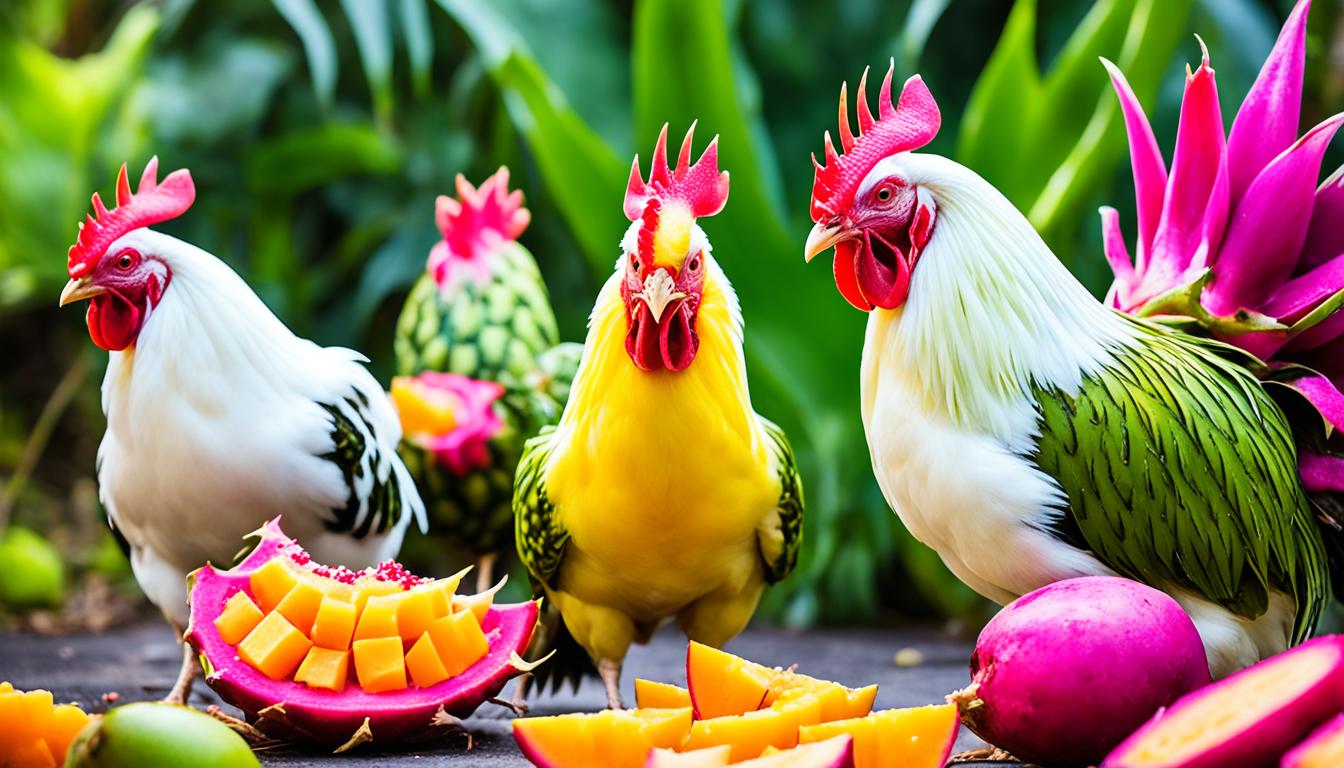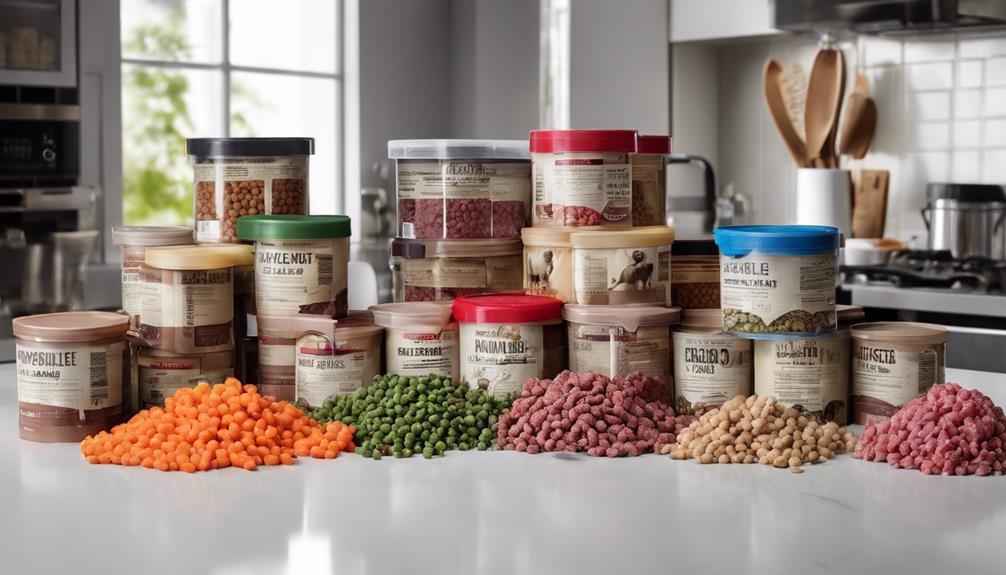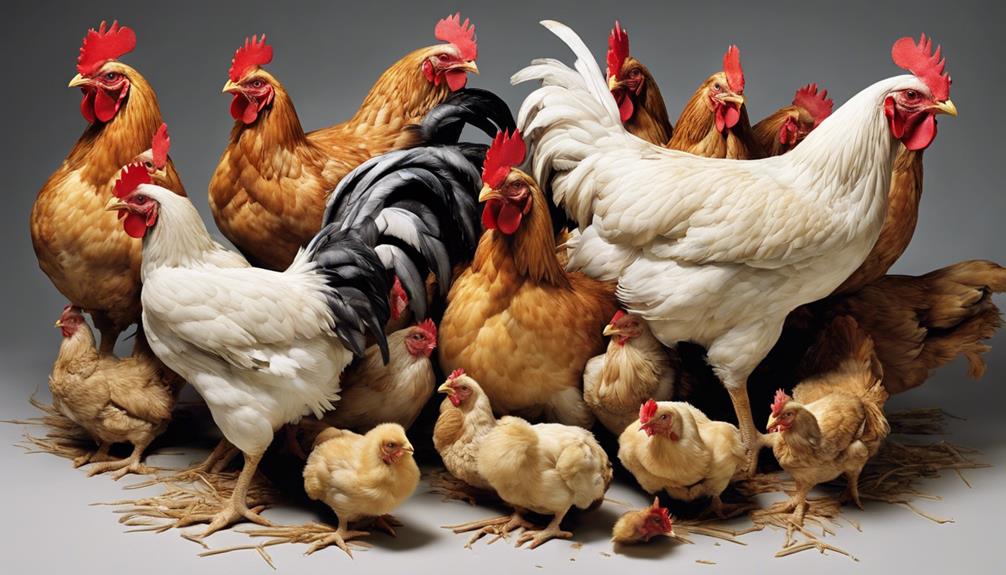Did you know that chickens can safely enjoy the tropical delight of dragon fruit? This exotic fruit, with its vibrant colors and unique appearance, may seem like an unlikely choice for our feathered friends. However, dragon fruit can provide chickens with important nutrients while adding variety to their diet. In this article, we will explore the safety of feeding dragon fruit to chickens and provide you with valuable tips to ensure a safe and balanced treat for your flock.
Key Takeaways:
- Dragon fruit is safe for chickens and can provide them with essential nutrients.
- Remove the spiky skin and seeds before feeding dragon fruit to chickens.
- Feeding dragon fruit in moderation is important to prevent digestive issues.
- Monitor chickens for any adverse reactions when introducing new foods to their diet.
- Dragon fruit should be given as a treat, not the sole source of nutrition for chickens.
What is Dragon Fruit?
Dragon Fruit, also known as Pitahaya, is a tropical and exotic fruit that originates from Central and South America. Its vibrant pink or yellow skin encompasses a delicately flavored white or red flesh. Dragon fruit’s unique appearance and enticing aroma make it a popular ingredient in cuisines around the world.
What sets dragon fruit apart from other fruits is the fact that it grows on cacti and primarily blooms at night. This nocturnal flowering attracts pollinators such as bats and moths, making dragon fruit a fascinating botanical wonder.
Nutritional Value of Dragon Fruit for Chickens
Dragon fruit, with its vibrant colors and unique appearance, not only makes for an enticing treat for humans but also offers several nutritional benefits for chickens. This section will explore the nutritional value of dragon fruit for chickens and why it can be a healthy addition to their diet.
Dragon fruit contains essential nutrients that support healthy growth and development in chickens. Per 100 grams, dragon fruit provides:
| Nutrient | Amount per 100g |
|---|---|
| Calories | 60 |
| Protein | 1g |
| Fat | 0.4g |
| Carbohydrates | 13g |
Aside from these macronutrients, dragon fruit is a good source of essential vitamins and minerals. It contains vitamin C, which boosts the immune system and supports overall health. Additionally, it provides iron, which is essential for proper oxygen transport in the body, and magnesium, which plays a vital role in bone health and muscle function.
Feeding chickens small pieces of dragon fruit can ensure they benefit from these important nutrients. It’s important to note that while dragon fruit can be a nutritious addition to their diet, it should be given in moderation and as part of a balanced feeding plan. As with any food, too much of a good thing can be detrimental.
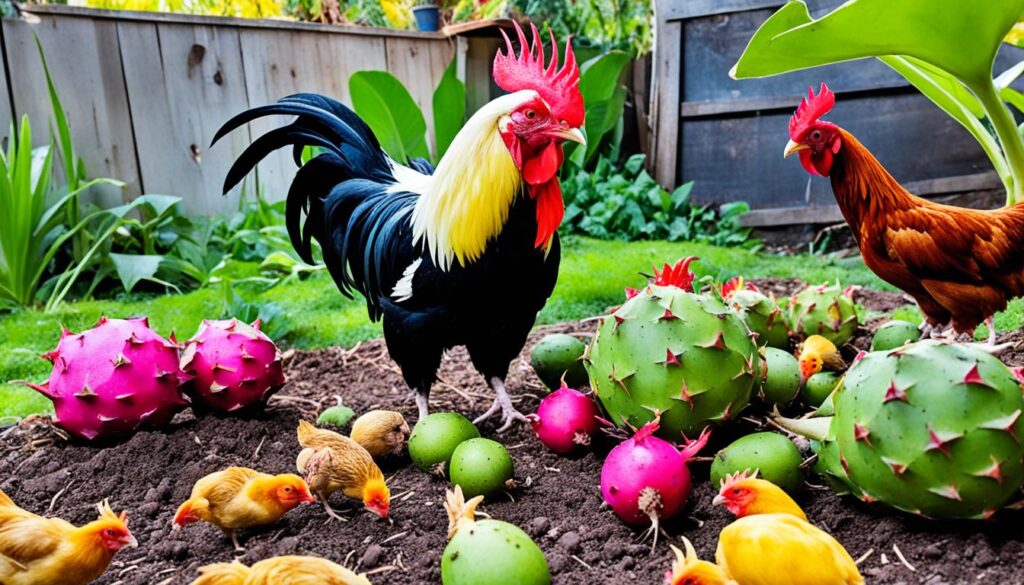
Keep in mind their overall nutritional requirements and consider the serving size and frequency of providing dragon fruit to ensure a well-rounded diet for your chickens.
Health Benefits of Dragon Fruit for Chickens
Dragon fruit is not only a delicious treat for humans but also offers numerous health benefits for chickens. Feeding your chickens dragon fruit can provide them with essential nutrients and promote their overall well-being. Here are some of the key health benefits that dragon fruit offers to chickens:
- Boosts Immunity: Dragon fruit contains high levels of vitamin C, which can strengthen the immune system of chickens, helping them fight off diseases and infections.
- Reduces Inflammation: The antioxidants present in dragon fruit help reduce inflammation in chickens, promoting healthier body functions and reducing the risk of chronic inflammation-related diseases.
- Aids Digestion: The fiber content in dragon fruit can improve digestion in chickens, preventing digestive issues such as constipation and bloating.
- Enhances Heart Function and Controls Blood Pressure: Dragon fruit contains beneficial compounds that can promote heart health in chickens by enhancing cardiovascular function and keeping blood pressure levels in check.
- Promotes Healthy Skin, Feathers, and Nails: The vitamins and minerals present in dragon fruit contribute to healthy skin and feathers, keeping chickens looking vibrant and ensuring strong nail growth.
- Reduces the Risk of Illnesses and Diseases: The antioxidants and phytochemicals in dragon fruit can help protect chickens from various illnesses and diseases, including certain types of cancers.
Feeding dragon fruit to chickens not only provides these health benefits but can also increase egg-laying productivity and minimize mortality rates among chicks. It is a nutritious and enjoyable addition to their diet.
“Dragon fruit offers a range of health benefits for chickens, including improved immunity, reduced inflammation, enhanced digestion, heart health, and protection against illnesses and diseases.”
Now that you know about the health benefits, let’s dive into the risks associated with feeding dragon fruit to chickens and the precautions you should take to ensure their safety.
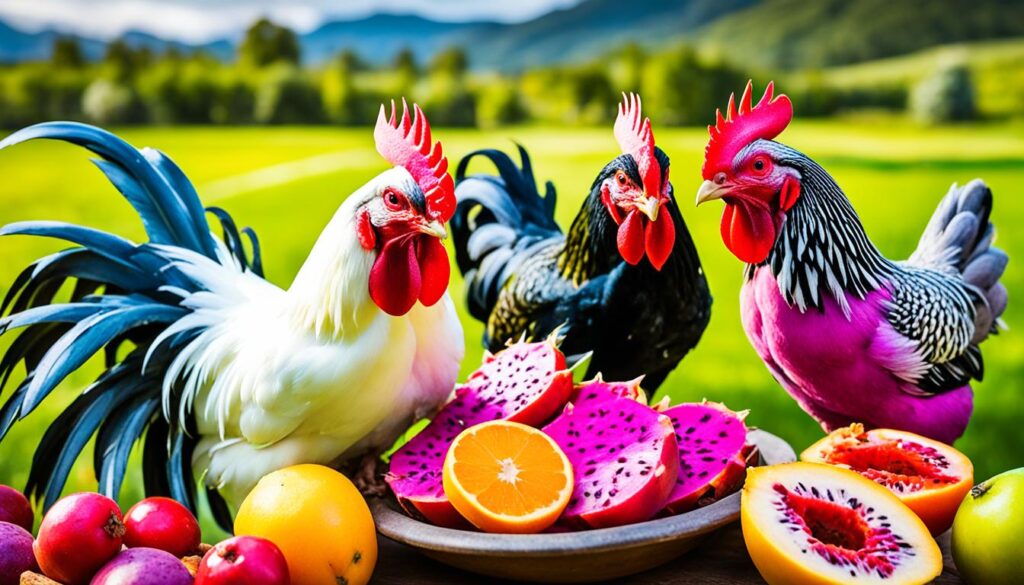
Risks of Feeding Dragon Fruit to Chickens
While dragon fruit is generally safe for chickens, it’s important to be aware of the potential risks associated with feeding it to them. Taking precautionary measures and monitoring their reactions can help ensure their well-being.
1. Digestive Issues
Feeding chickens excessive amounts of dragon fruit can lead to digestive problems such as diarrhea, bloating, and gas. This is primarily because dragon fruit is high in fiber. It’s essential to provide the fruit in moderation to avoid any discomfort or disruptions in their digestive system.
2. Allergic Reactions
Chickens may develop allergies to certain components present in dragon fruit. As a result, they may experience symptoms like itching, rash, swelling, respiratory distress, or gastrointestinal disorders. If any of these signs are observed after feeding them dragon fruit, it’s advisable to consult a veterinarian for further evaluation and guidance.
3. Moderation and Monitoring
To mitigate the risks associated with feeding dragon fruit to chickens, it’s crucial to practice moderation. Offering small portions of dragon fruit as an occasional treat or supplement to their regular diet can help maintain balance. Additionally, closely monitoring the chickens for any adverse reactions can enable prompt intervention and adjustment of feeding practices if necessary.
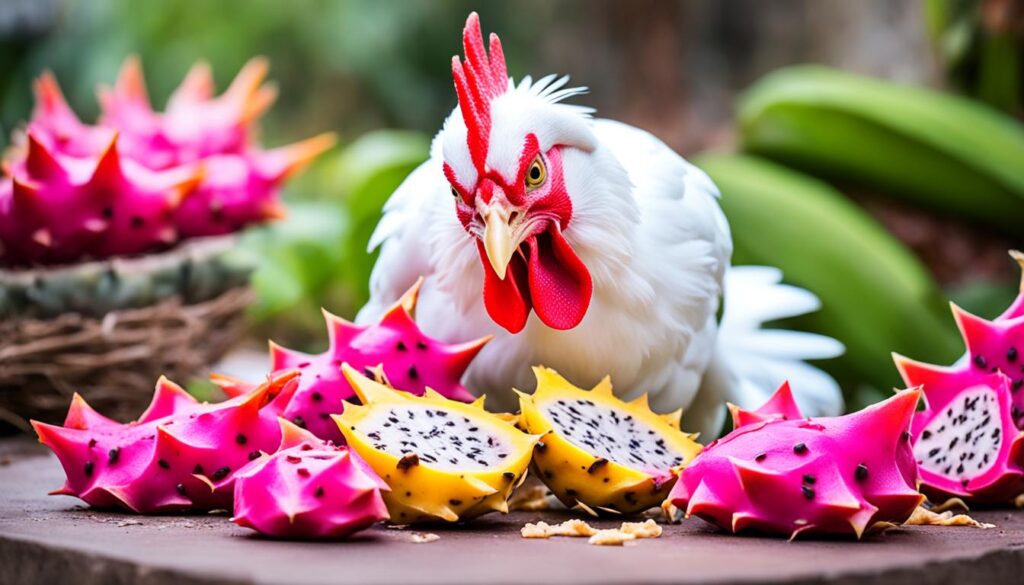
“Feeding chickens excessive amounts of dragon fruit can lead to digestive problems such as diarrhea, bloating, and gas.”
| Risks of Feeding Dragon Fruit to Chickens | Precautionary Measures |
|---|---|
| Digestive Issues | Feed in moderation to avoid discomfort and digestive disruptions. |
| Allergic Reactions | Watch for symptoms, and consult a veterinarian if necessary. |
| Moderation and Monitoring | Offer small portions and closely observe chickens’ reactions. |
Precautions to Take
Feeding dragon fruit to chickens can be a healthy and enjoyable addition to their diet. However, there are some precautions to take to ensure their safety and well-being. By following these simple guidelines, you can protect your chickens from any potential hazards associated with dragon fruit.
Washing the Fruit
Before feeding dragon fruit to your chickens, it’s important to wash the fruit thoroughly with clean water. This helps remove any pesticides or contaminants that may be present on the skin. By washing the fruit, you can ensure that your chickens consume only the beneficial nutrients without any harmful substances.
Cutting into Small Pieces
Dragon fruit should be cut into small, bite-sized pieces before feeding it to chickens. This not only makes it easier for them to eat but also eliminates the risk of choking hazards. By cutting the fruit into smaller pieces, you can ensure that your chickens can consume it safely without any discomfort.
Removing the Skin and Seeds
When preparing dragon fruit for chickens, it’s essential to remove the skin and seeds. The skin can be tough and difficult for chickens to digest, while the seeds can pose a choking hazard. By removing these parts, you eliminate any potential digestive issues or risks to your chickens’ health.
Introducing Gradually and Monitoring
When introducing dragon fruit to your chickens’ diet, it’s best to do so gradually. Start by offering small amounts and observe how they respond. Monitor your chickens for any adverse reactions such as diarrhea or vomiting. If any unusual symptoms occur, discontinue feeding dragon fruit and consult a veterinarian.
Tip: It’s important to remember that chickens have different dietary preferences and tolerances. While most chickens can enjoy dragon fruit without any issues, some may have individual sensitivities or allergies. Always be cautious when introducing new foods and closely observe your chickens’ reactions.
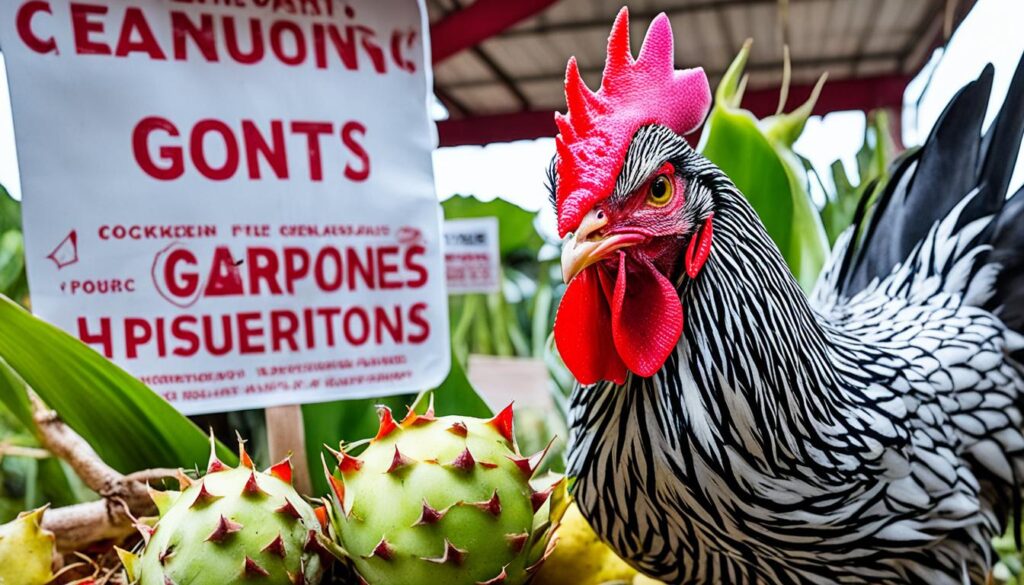
Incorporating dragon fruit into your chickens’ diet can be a beneficial and enjoyable experience. By taking these precautions and ensuring their safety, you can provide your chickens with a nutritious treat that supports their overall health and well-being. Remember to prioritize moderation and monitor your chickens closely for any signs of discomfort or adverse reactions. With proper care, feeding dragon fruit to your chickens can be a rewarding and enriching part of their diet.
Serving Size and Frequency
When it comes to feeding dragon fruit to chickens, serving size and frequency are key considerations. It’s important to offer the right amount of this delicious treat to avoid any digestive issues and keep your chickens healthy. Monitoring their response and adjusting the serving size and frequency accordingly is essential. Here are some guidelines to help you determine the appropriate serving size and frequency for feeding dragon fruit to chickens:
Serving Size:
- Offer quarter-sized pieces of dragon fruit to chickens on a weekly basis.
- Provide half-sized pieces of dragon fruit every two weeks.
- Give a whole piece of dragon fruit as a special treat once a month.
Remember, while dragon fruit is nutritious for chickens, it should be given in moderation. It’s best to offer it as a treat rather than a major part of their diet. This will help prevent any potential digestive issues, as dragon fruit has high water and sugar content.
Frequency:
Dragon fruit should be fed to chickens a couple of times per week. To ensure a balanced diet, it’s important to rotate the fruit with other treats and make it a part of their overall feeding schedule.
However, keep in mind that the size of your flock will determine the quantity of dragon fruit to offer at each feeding. As a general guide, 2-3 dragon fruits can be given to chickens, depending on their size and appetite.
Always remember that dragon fruit should be considered a supplemental treat and not the sole source of nutrition for your chickens. Variety is key when it comes to their diet, so be sure to incorporate other fruits, vegetables, and grains to provide a well-rounded and nutritious meal plan.
By following these serving size and frequency guidelines, you can ensure that your chickens enjoy the benefits of dragon fruit while maintaining a healthy balance in their diet.
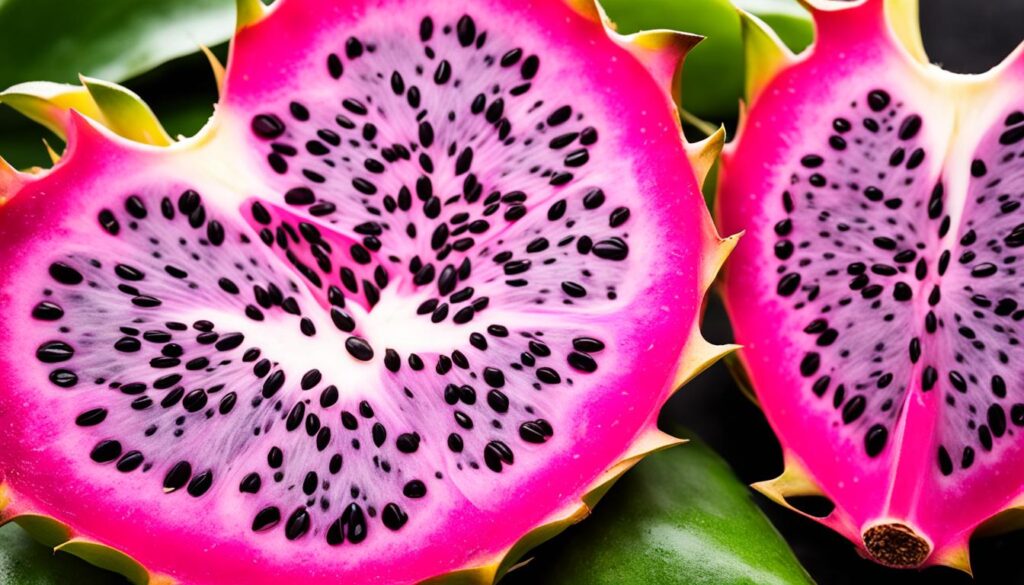
Risks and Benefits of Feeding Dragon Fruit Skin to Chickens
Dragon fruit skin can be safely consumed by chickens, although it may require cutting into smaller pieces due to its toughness. The skin of dragon fruit is packed with nutrients that can provide various benefits to chickens. These include antioxidants, pectins, betacyanin, vitamins, and dietary fiber. These nutrients contribute to the overall health and well-being of the chickens.
However, it’s crucial to ensure that the dragon fruits chosen for feeding the chickens have been organically grown. This precaution helps avoid potential chemical residues that may be present in conventionally grown fruits. By opting for organic dragon fruits, the risks associated with harmful chemicals can be minimized, safeguarding the well-being of the chickens.
While dragon fruit skin offers nutritional benefits, it’s essential to feed it in moderation to prevent any potential toxic effects resulting from chemicals or excessive consumption. Maintaining a balanced and varied diet for chickens is crucial, incorporating a range of nutritious treats, including dragon fruit skin, to promote overall health.
Benefits of Feeding Dragon Fruit Skin to Chickens:
- Provides essential nutrients like antioxidants, pectins, betacyanin, vitamins, and dietary fiber
- Supports overall health and well-being of chickens
- Contributes to a nutritious and balanced diet for chickens
Risks of Feeding Dragon Fruit Skin to Chickens:
- Potential exposure to chemical residues if not organically grown
- Possible toxic effects from excessive consumption
Overall, feeding dragon fruit skin to chickens can be beneficial, but it’s vital to exercise caution and moderation to ensure the well-being and safety of the flock.
| Benefits | Risks |
|---|---|
| Provides essential nutrients | Potential exposure to chemical residues |
| Supports overall health | Possible toxic effects from excessive consumption |
| Contributes to a balanced diet |
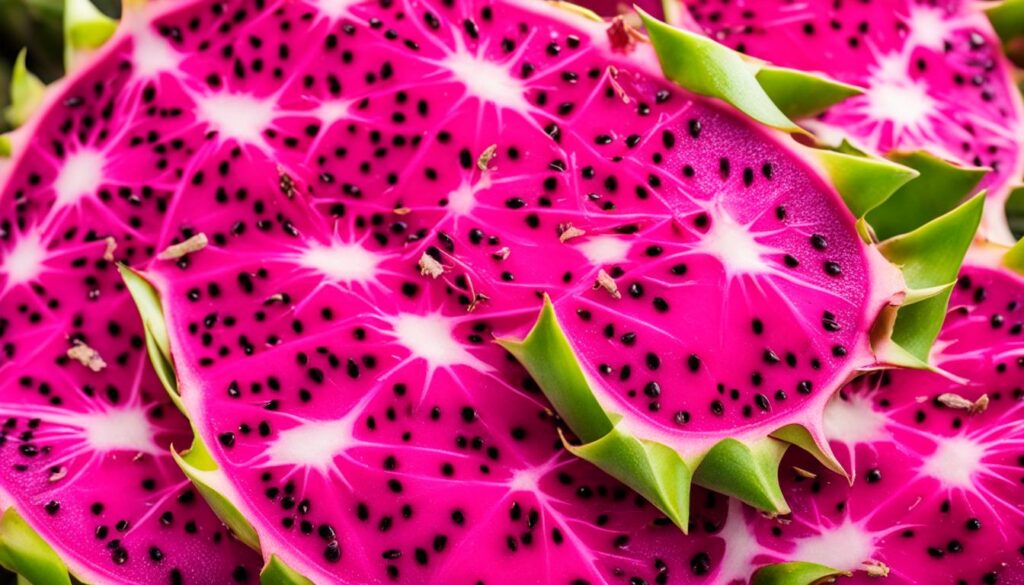
How to Feed Dragon Fruit to Chickens
When it comes to feeding dragon fruit to chickens, there are various methods you can use to ensure they enjoy this tropical treat. Here are a few suggestions:
- Halves on the Ground: Cut the dragon fruit into halves and lay them on the ground for the chickens to explore. The vibrant color and unique texture will pique their curiosity, and they will peck at it to enjoy the juicy flesh.
- Hanging From a Branch: For a fun feeding experience, you can hang the dragon fruit from a branch in the chicken coop or run. This lets the chickens jump or fly up to reach the fruit, engaging their natural instincts and providing entertainment while they enjoy their treat.
- Slices in Feeders: Another option is to slice the dragon fruit and place the pieces in their feeders. This ensures the fruit stays clean and prevents dirt from getting on it. Mixing it with other fruits and vegetables can create a delightful surprise in their feeders, encouraging them to explore and experiment with different flavors.
Remember, introducing dragon fruit to chickens should be an enjoyable experience that promotes their well-being and provides a nutritious addition to their diet. Be creative and find the feeding method that works best for your flock!
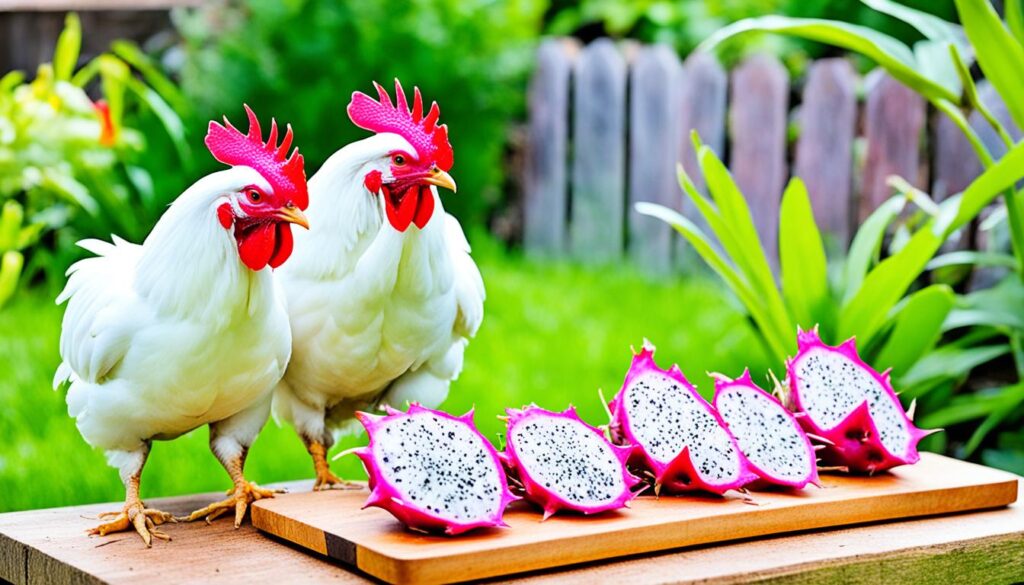
How Much and How Often to Feed Dragon Fruit to Chickens
Feeding dragon fruit to chickens requires moderation to ensure their optimal health and well-being. Due to its high water and sugar content, it is important to offer dragon fruit as a treat rather than a staple. Providing it a couple of times per week is sufficient, allowing for a balanced and varied diet.
It is recommended to rotate dragon fruit with other treats to ensure chickens receive a diverse range of nutrients. This can include a mix of fruits, vegetables, and grains to meet their dietary needs. By offering a variety of treats, you can provide a well-rounded nutritional profile for your flock.
Depending on the size of your flock, you can provide 2-3 dragon fruits per feeding. Keeping in mind that chickens have different preferences, observe their response to the fruit and adjust the serving size accordingly. Always remember that moderation is key to avoid potential digestive issues.
While dragon fruit is a nutritious addition to a chicken’s diet, it should not be the sole source of nutrition. It is essential to ensure they have access to a complete and balanced feed specifically formulated for their needs. Supplements and treats like dragon fruit should complement their diet, enhancing their overall health and satisfaction.
Feeding Guide:
- Feed dragon fruit to chickens a couple of times per week.
- Rotate dragon fruit with other treats to provide variety.
- Offer 2-3 dragon fruits per feeding, adjusting serving size based on flock size.
- Ensure chickens have access to a complete and balanced feed as their main source of nutrition.
By following these guidelines, you can provide your chickens with the benefits of dragon fruit while maintaining their overall well-being. Remember to monitor their response and consult a veterinarian if you have any concerns. Happy chickens enjoy a diverse and nutritious diet!
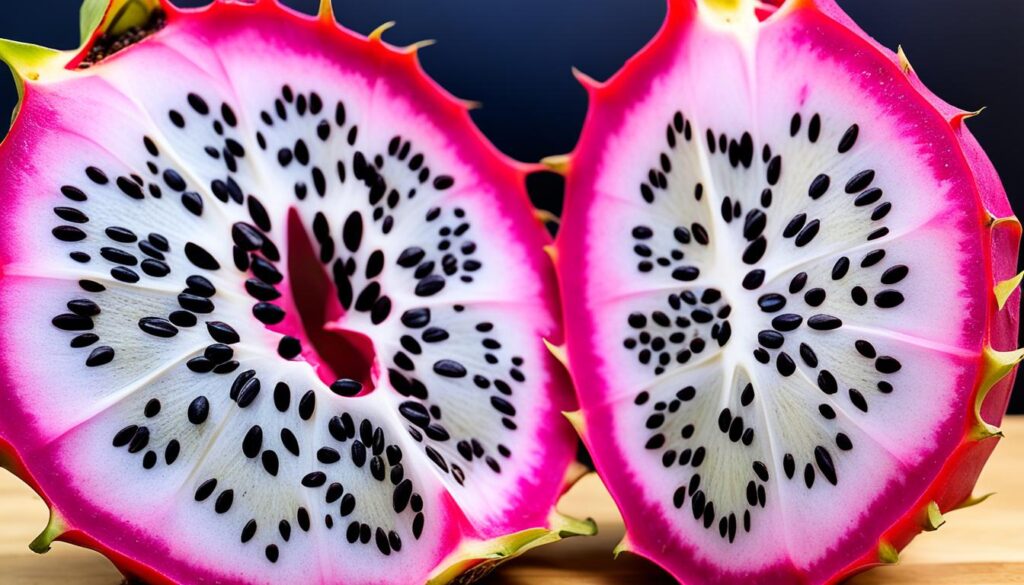
Conclusion
In conclusion, chickens can safely enjoy the delicious and nutritious treat of dragon fruit. This tropical fruit is packed with vitamins, minerals, and antioxidants that support their overall health. However, it’s crucial to remember a few important feeding tips to ensure their safety.
Firstly, it’s essential to remove the skin and seeds of the dragon fruit before feeding it to chickens. Although the flesh is safe for consumption, the spiky skin and hard seeds can pose choking hazards and digestive issues.
Secondly, moderation is key. While dragon fruit provides valuable nutrients, feeding it in excess can lead to digestive problems such as diarrhea, bloating, and gas. It’s crucial to offer dragon fruit as a treat in conjunction with a balanced diet to avoid any adverse effects.
Lastly, closely monitor your chickens for any adverse reactions to dragon fruit. Every chicken’s digestive system is unique, and some may have allergies or sensitivities to certain foods. If you notice any abnormal behavior or health concerns, consult a veterinarian for proper guidance.
By following these safe feeding tips, you can confidently introduce dragon fruit as a healthy addition to your chickens’ diet. They’ll enjoy the flavorful treat while reaping the nutritional benefits it provides. Remember to prioritize their well-being and make informed decisions about their dietary choices.
